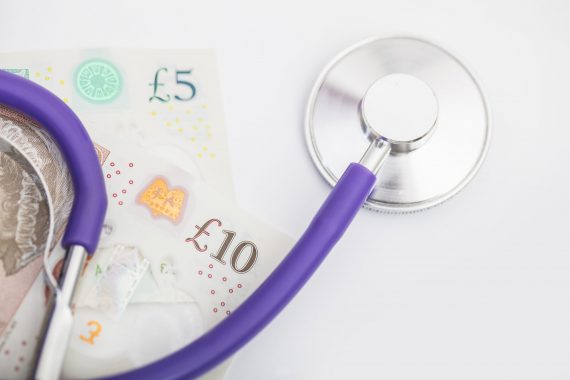Data lowdown: Have UK GPs really had a 3% pay rise?

GPs of all kinds in nearly every part of the UK saw their income rise more than expected in the year between 2015/16 and 2016/17, with an average increase of nearly 3%.
That year, the Government and the BMA’s GP Committee had negotiated a 1% pay uplift after expenses.
However, GP leaders have said the data from NHS Digital, released last week, could just be yet another sign of a thinly spread workforce.
Overall, the average income before tax for both salaried GPs and partners working in either a GMS or a PMS practice across the UK was £92,500 in 2016/17 – a 2.7% increase on the year before.
For partners alone, the growth in income was significant, with the average GP partner earning £105,500 after expenses – a 4% increase and the largest year-on-year jump in 11 years.
Even the lowest annual earning – £53,700 as a salaried GP in Wales – represented a 4% increase.
The only GPs to experience a decline were partners those based in Northern Ireland, whose earnings dropped by 1.7% to £90,500 – the lowest estimate since 2010/11. However, salaried GPs in the country saw an increase in wages of 17% to £55,300 in 2016/17.
Thinning workforce
But Dr Richard Vautrey, BMA GP Committee chair, said the increase is a numbers game. With declining workforce numbers, GPs are having to ‘spread themselves more thinly… taking on additional work [and] forced to work longer hours,’ he said.
He added: ‘It is likely the falling workforce accounts for a significant proportion of the apparent rise in an average partner’s salary, as funding allocated to them to meet the needs of their patients is shared between fewer doctors’.
Last week, official data showed that the GP workforce situation has worsened further, as full-time equivalent GP numbers have dropped by 523 since March.
Meanwhile, in the last decade, 5,000 GP partners have left the workforce because of the role’s high risk and workload.
Dr Vautrey added that the year-on-year increase in payments ‘does not compensate for this working environment that is often proving unsustainable’, calling attention to the decline in GP earnings over the last decade.
In 2006/7, all types of GPs on average earned £120,308, compared with £92,500 in 2016/17 – a reduction of 23%.
Taxation backlash
Bob Senior, head of medical services at accountancy firm RSMUK, told Pulse that a smaller workforce is creating a ‘vicious circle’, whereby the remaining GPs ‘don’t really have the option of reducing sessions to avoid paying nasty tax rates’.
He explained that once GPs have a taxable income above £100,000, HMRC restricts personal tax free allowance, ‘so effectively any profits you earn between £100,000 and £123,000 are taxed at 60% and you’re paying 2% national insurance… and if you’re still an active member of the NHS pension scheme, they’re taking their 28.8% as well’.
He said: ‘So although the profits have crept up a bit, there’s not a lot actually translating into the doctor’s pockets.’
Mr Senior added that not only are fewer GPs increasing demand on those that remain but the growing reliance on locums to compensate is also taking a financial toll on partners.
Soaring expenses
Over the last decade, the expenses to earnings ratio, representing the proportion of gross earnings taken up by expenses, has risen by more than nine percentage points from 56.5% in 2006/7 to 66% in 2016/17.
Meanwhile, the total cost of expenses increased by nearly 9% in just one year in cash terms, and by 45% over the same decade.
GP partners in England had the highest average total expenses in 2016/17 at £228,700, while those in Northern Ireland had the lowest at £104,700.
Dr Vautrey said the record high expenses to earnings ratio makes it ‘clear that GPs are under huge pressure to cope with the rising costs of running a practice’.
He said: ‘GP partners… are small business owners, managing increasingly burdensome bureaucracy and the soaring cost of indemnity, and dealing with issues with practice premises.’
Nevertheless, Dr Vautrey remained cautiously optimistic that, with the latest increase, ‘at long last GPs may be seeing an end to repeated pay cuts’.
Pulse July survey
Take our July 2025 survey to potentially win £1.000 worth of tokens













